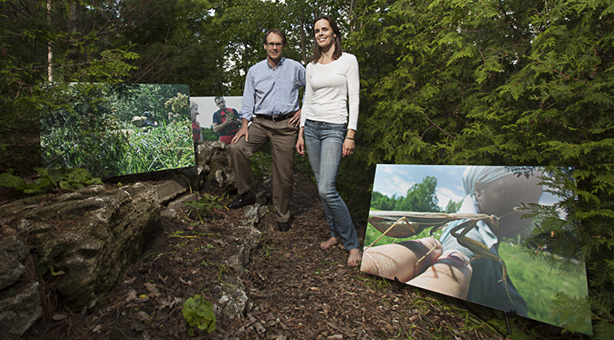
Last year, Queen’s University Biological Station (QUBS) director Steve Lougheed spoke to the Nature Conservancy of Canada’s (NCC) National Board of Directors about his efforts to set up an Elbow Lake Environmental Education Centre. In response to a need for funding, QUBS had stepped up its outreach programs. In addition to field trips for public school classes, it offers workshops in nature photography, art and birding. Urban Cub and Scout groups come out to learn about nature. The station has also partnered with other conservation organizations, such as the NCC and the Rideau Waterways Land Trust.
Lougheed spoke passionately about the need for greater connectivity between the university and the general community, and between people and nature. They wanted to do even more.
In the audience was the NCC Board’s chair, Laurie Thomson, Artsci'84. After his talk Laurie approached Steve and told him that she and her husband Andy Chisholm, Com’81, would like to help. Laurie and Andy gave QUBS a $700,000 donation through the Initiative Campaign, earmarked specifically for the Education Centre. With the money, QUBS purchased a 20-percent undivided share of the Elbow Lake property and hired a general manager.
QUBS was established as the field station for the Department of Biology at Queen’s in 1945. Situated on Lake Opinicon, about a kilometer from the hamlet of Chaffey’s Locks and 40 minutes north of Kingston, the facility now consists of 35 buildings, including 12 labs, a library, cabins and cottages to accommodate up to 90 residents, and the new Raleigh J Robertson Biodiversity Centre, which opened in 2000, a huge complex containing a conference room, a dining room and kitchen, showers, computer labs, and offices.
Laurie and Andy’s support makes it possible for the team of researchers and faculty members at QUBS to provide undergraduate and graduate field study opportunities. Their gift enables vital conservation research and public education so that we can better understand issues that affect the environment and make decisions that protect it.
"Andy and I are honoured to contribute to ensuring that the Elbow Lake facility will be able to provide education and research capabilities for the foreseeable future,” says Laurie. “Kids who grow up without an understanding of the wonder and importance of nature are not likely to make environmentally intelligent decisions when push comes to shove."

